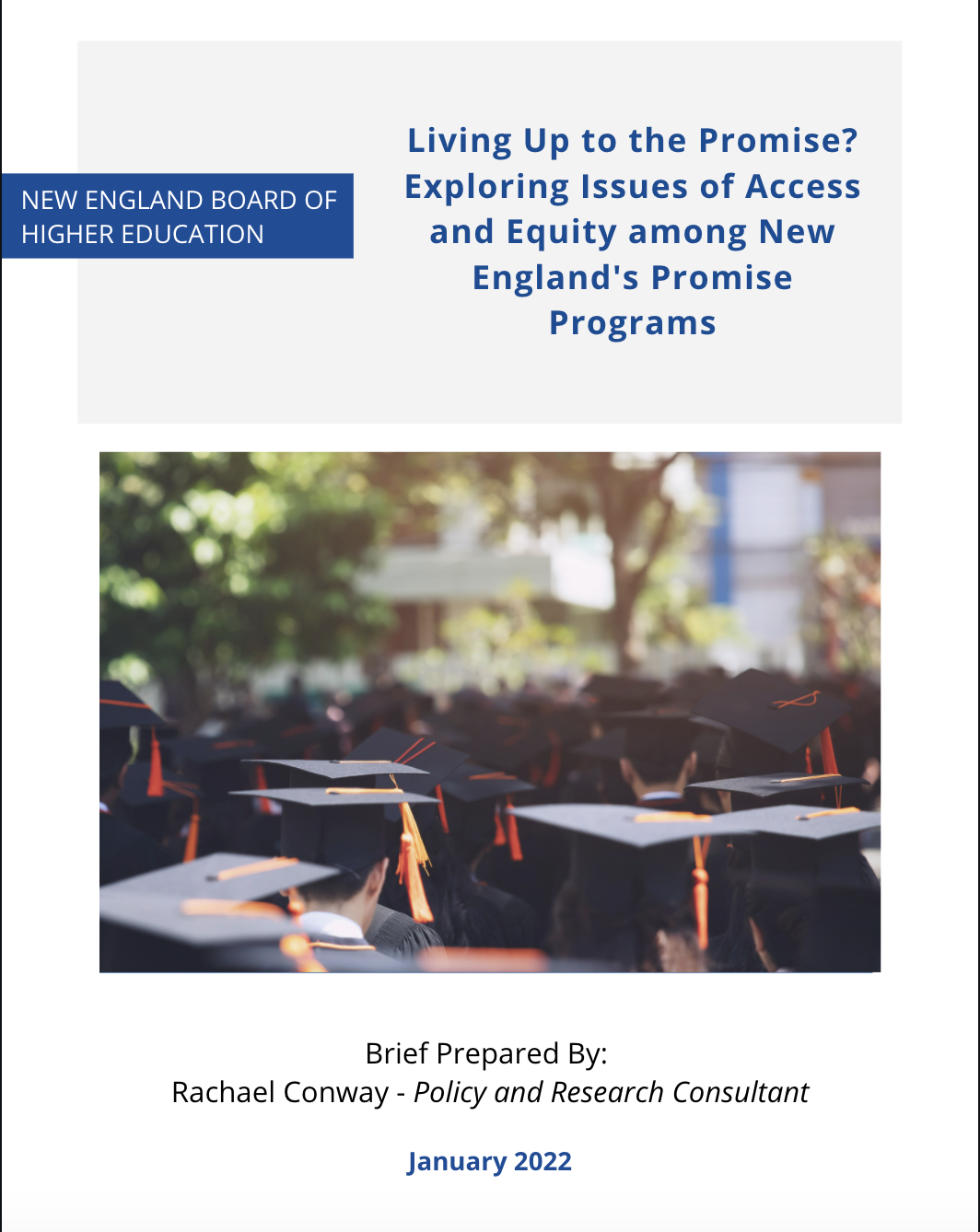 Free college policies—commonly known as “Promise” programs—are important promoters of equity in higher education. Some specific elements help ensure these free college programs truly encourage equity, especially for students from low-income backgrounds. These elements include: providing financial support beyond the costs of tuition and fees, supporting adult learners and undocumented students, and never converting student financial support into loans that need to be repaid, according to a new report from the New England Board of Higher Education (NEBHE) titled “Living Up to the Promise? Exploring Issues of Equity and Access among New England’s Promise Programs.”
Free college policies—commonly known as “Promise” programs—are important promoters of equity in higher education. Some specific elements help ensure these free college programs truly encourage equity, especially for students from low-income backgrounds. These elements include: providing financial support beyond the costs of tuition and fees, supporting adult learners and undocumented students, and never converting student financial support into loans that need to be repaid, according to a new report from the New England Board of Higher Education (NEBHE) titled “Living Up to the Promise? Exploring Issues of Equity and Access among New England’s Promise Programs.”
For the first time in U.S. history, a proposal for nationwide free community college passed through the House of Representatives in the fall of 2021. Although the provision was ultimately dropped from President Joe Biden’s Build Back Better bill, its early presence suggests the political appeal of making college accessible to more Americans.
In New England, where incomes have grown at a slower rate than the price of college tuition, the need for affordable postsecondary education is at an all-time high. And the opportunity gaps between those who can access a college education and those who cannot have only grown wider in the era of Covid.
NEBHE’s recent report investigates exactly which students these New England promise programs serve, how much support they offer students, especially low-income students, and whether promise programs promote clear paths to college graduation and beyond.
The promise program movement began in 2005, after the Kalamazoo Promise launched in Michigan with the hope of invigorating economic growth and educational achievement in the city. Currently more than 350 promise programs operate across the country today, and no two programs are exactly alike. Indeed, some observers worry that promise programs’ widely varying eligibility requirements create a disconnect between perception and reality in terms of what “free college” really means in a specific location.
In the report, a promise program refers to a place-based college scholarship that covers all or most of the cost of attending college for all eligible students. Using this definition, NEBHE found that New England is home to at least nine promise programs in various states, municipalities and college systems. Every New England state except Maine has at least one promise program serving some of its residents. The region’s oldest promise program, the New Haven Promise, has been around since 2010, while the newest program, the Rhode Island Promise, was formally instituted in May 2021.
The NEBHE report spotlights four New England promise programs to explore how their design, funding and structure impact their ability to serve students in their operating areas. The Rhode Island Promise, Boston’s Tuition-Free Community College Plan, Hartford Promise and New Haven Promise all exist to increase college access and attainment in the city or state in which they operate. However, they all possess widely different eligibility requirements and offer varying benefits to students.
Some findings from the report include:
- Promise programs that offer free tuition at four-year colleges and universities see higher on-time graduation rates, and pay more to each student, than community college-only programs because of the higher cost of tuition at four-year universities.
- Using a “last-dollar” scholarship model, in which promise programs fill remaining gaps in students’ financial aid after all other grants and scholarships have been applied, can help programs serve more students but such programs also direct substantially more funds toward students from middle- and upper-income families.
- None of the promise programs in the region currently allow students to enroll in college part-time.
- Some of New England’s promise programs go beyond covering the costs of tuition to provide students with mentoring and professional development opportunities.
The recent NEBHE report is unique in that it not only provides a deep dive into the structure of differing New England promise programs, but also aims to outline practices for building an equitable free college program. Such practices include supporting adult learners and undocumented students, providing financial support beyond the costs of tuition and fees, and never converting student financial support into loans that need to be repaid.
By performing an “equity analysis” of the nine studied New England promise programs, the report finds that the New Haven and Hartford Promise programs meet the greatest number of equity metrics in the region by supporting primarily low-income and other students from historically underserved communities, building clear pathways to college graduation, and investing in their communities.
The report concludes with policy recommendations for lawmakers hoping to improve existing promise programs or implement new ones. Free college policies have the potential to alleviate some of the financial and psychological barriers of accessing a postsecondary education. However, if the policies are not designed to improve college access and completion for the region’s historically excluded groups, they will continue to entrench opportunity gaps and worsen inequality. New England’s promise programs each contain strengths and weaknesses when it comes to improving access and equity in higher education. Regional programs should learn from one another, as well as programs across the country, to ensure that their promise to students and families rings true: that higher education is within reach for all students.
Rachael Conway is a NEBHE policy and research consultant and author of the report “Living Up to the Promise? Exploring Issues of Equity and Access among New England’s Promise Programs.”
[ssba]
